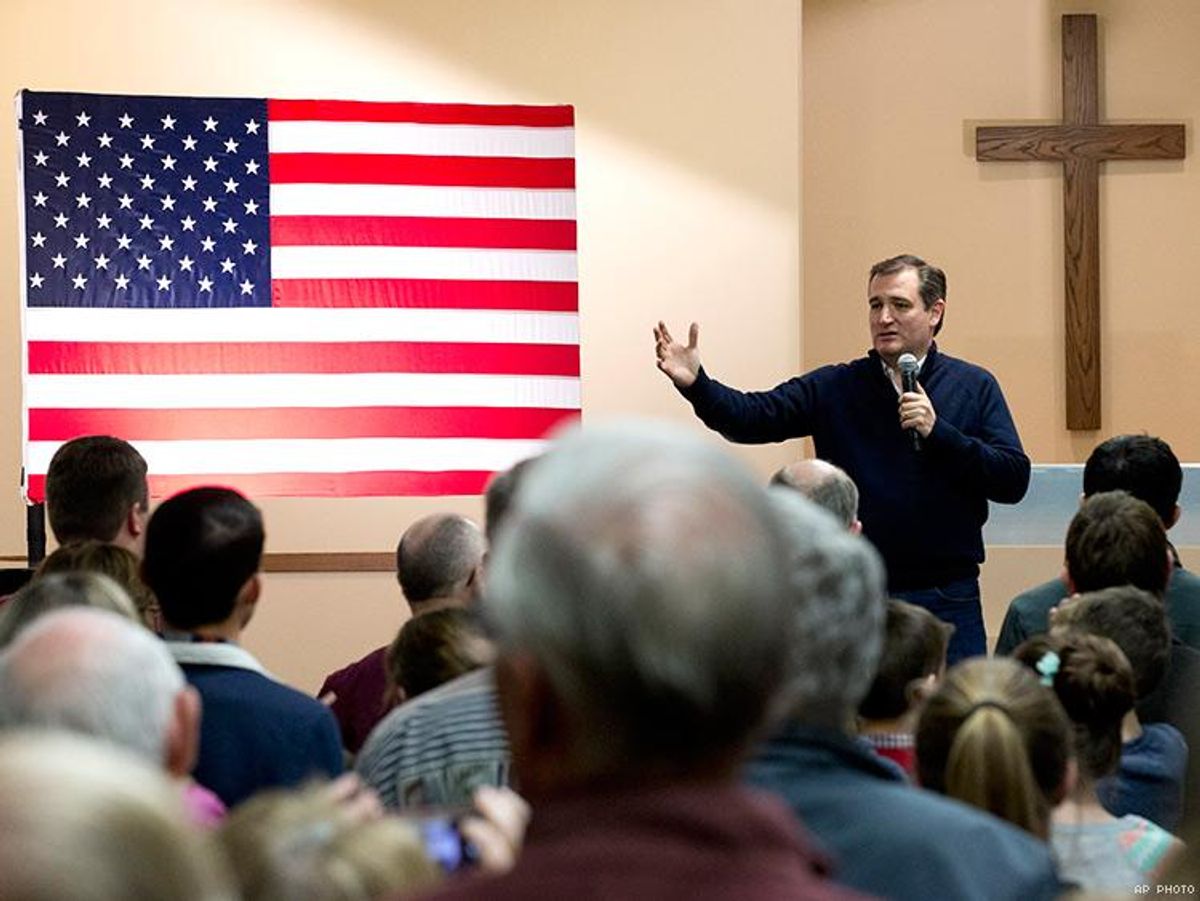As U.S. Sen. Ted Cruz stays on his quest to best Donald Trump for the Republican presidential nomination, he's continuing to court the support of religious right leaders.
The Texas senator already has the endorsement of many conservative Christian activists, but his campaign team sought more backers at last weekend's Awakening conference in Orlando, Fla., Right Wing Watch reports.
Campaign volunteers "asked pastors to sign a commitment card allowing their names to be used publicly" and "encouraged pastors to host a voter registration drive and regularly address political and cultural issues from the pulpit," the site notes.
A flyer distributed at the conference read, "Your endorsement encourages members of your congregation and your community to vote for Ted Cruz. It inspires courage in other leaders to endorse too, multiplying the influence."
The annual conference, sponsored by the far-right Liberty Counsel and Freedom Federation, featured many stars of conservative Christianity and much anti-LGBT rhetoric, some of it violent. Retired Lt. Gen. Jerry Boykin, who is now executive vice president of the Family Research Council (an organization designated an anti-LGBT hate-group by the Southern Poverty Law Center), gave a speech in which he contended that Christians have not done enough to stand up to the LGBT rights movement, according to Right Wing Watch.
"Where are the Christians of America today?" he said. "They should be flocking to people like Kim Davis. They should be flocking to the city council and say, 'No, you're not going to let a man go in my daughter's bathroom just because he feels like a man today' [Boykin likely meant 'woman']. Where are the Christians that are standing up to this kind of evil? ... The first man that walks in my daughter's bathroom, he ain't going to have to worry about surgery."
Other speakers included Paul Blair, an Oklahoma minister who has endorsed Cruz and is seeking to undo marriage equality, and Franklin Graham, who is well known for his anti-LGBT views.
Cruz wasn't the only candidate getting attention at the event. Televangelist James Robison, who said he would prefer Cruz, Sen. Marco Rubio of Florida, or Ohio Gov. John Kasich as the Republican nominee, told conference attendees that Christians should not fear Trump, as God could use him, according to Right Wing Watch.
Trump has the support of some religious right leaders, such as Jerry Falwell Jr. and Robert Jeffress. But Cruz has probably the most endorsements from the Christian right, with big names including Tony Perkins, James Dobson, Bob Vander Plaats, Gary Glenn, and Duck Dynasty patriarch Phil Robertson. Both Cruz and Rubio have religious advisory boards for their campaigns, with ample representation of anti-LGBT activists.
Cruz, Rubio, and Trump have all espoused anti-LGBT views, saying they'd appoint Supreme Court justices who'd reverse the marriage equality ruling and voicing support for the proposed First Amendment Defense Act, allowing discrimination against LGBT people if it's rooted in religious beliefs, or at least, in the case of Trump, supporting the general principles of the bill.
Kasich has been a bit more measured, if not exactly LGBT-friendly. He has said he favors limiting marriage to male-female couples, but he accepts the Supreme Court's decision, and he has attended at least one same-sex wedding. At a debate last month, he appeared to denounce so-called license to discriminate legislation, but he walked that back last week. Business owners shouldn't refuse to serve LGBT customers generally, but asking them to participate in something that goes against their beliefs is a different matter, he said, obviously referring to providing goods and services for same-sex weddings.
"If you go to a photographer to take pictures at your wedding, and he says, 'I'd rather not do it,' find another photographer, don't sue them in court," Kasich said in last week's debate. He said he hopes there won't be a need for laws to uphold businesses' right to refuse services, but "if somebody is being pressured to participate in something that is against their deeply held religious beliefs, then we're going to have to think about dealing with the law."


















































































